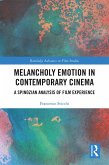Engaging with debates in Marxism and contemporary film theory about political aesthetics, the book centers around the question of whether we can imagine possible futures through negative aesthetics, which are skeptical of cinema's ability to reproduce reality in a comprehensive and unmediated manner. In particular, it analyzes examples of ambiguous art cinema and related hybrid documentary modes in order to invite spectators to rethink how we understand and represent the unique experiences of living through the collapse of authoritarian communism and the transition to neoliberal capitalism. Negative Aesthetics and Political Collapse ultimately argues that the skepticism about political change and representing history found in these films forms an original mode of utopian thinking. In other words, their negativity about their own artistic autonomy is the very thing that allows them to hint at possible futures that are unpresentable because they exist outside of the frameworks of contemporary geopolitics and our dominant understandings of cinematic aesthetics.
Redefining how we understand the intersections between geopolitics, art cinema aesthetics, and film theory, the book presents a unique synthesis of film and political theory that attempts a new understanding of cinematic aesthetics. As such, it will interest scholars of film theory, global art cinema aesthetics, regional studies of Eastern Europe and the Balkans, and political science.
Dieser Download kann aus rechtlichen Gründen nur mit Rechnungsadresse in A, B, BG, CY, CZ, D, DK, EW, E, FIN, F, GR, HR, H, IRL, I, LT, L, LR, M, NL, PL, P, R, S, SLO, SK ausgeliefert werden.









